Part 4
Fuzzing Crypto
Bignum arithmetic
Crypto is math
Math is implemented in code and code has bugs
Security considerations for crypto usually simply assume the math is correct
Example
Modular Exponentiation
modexp(x, y, n) = xy mod N
Modular Exponentiation
Basic operation widely used in public key cryptography.
(RSA, Diffie Hellman, ECC)
RSA-CRT
Optimization for RSA signatures using some precomputed values that are commonly part of the private key.
RSA-CRT intuition
Instead of doing one large modular exponentiation it is split up into three smaller ones.Lenstra's attack on RSA-CRT
Given the input, the public key and a single signature where one of the calculations went wrong we can calculate the private key.
Math correctness
A single faulty modular exponentiation can leak the private key.
Powerful attack
- Exposing the private key.
- Any kind of error in the modular exponentiation works.
Does that really happen?
Of course!
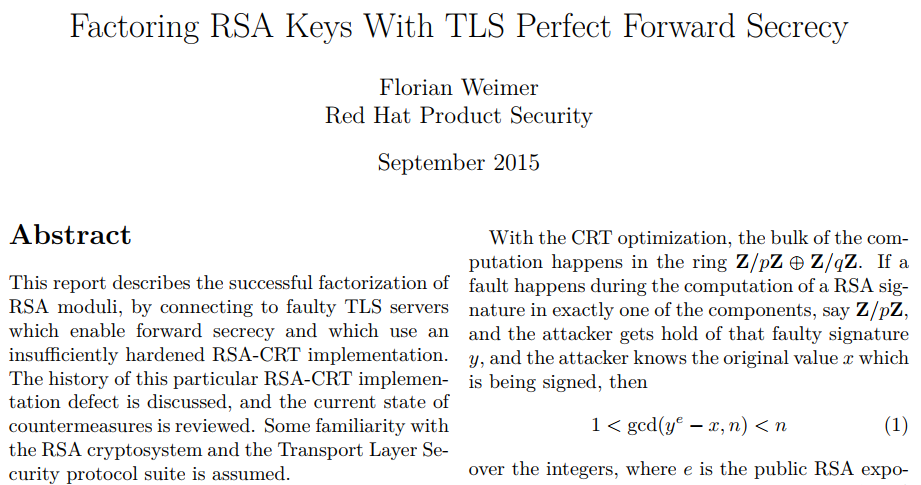
Guaranteeing 100% correctness of calculations is hard.
Not just software bugs, also hardware failures like Rowhammer.
To protect against this attack it's recommended to always verify signatures before exposing them.
Fuzzing
This may seem unrelated, but we'll get back to crypto soon.
Traditional Fuzzing
- Create (many) random inputs
- Feed inputs into software
- Wait until it crashes
Original:
{"name":"Smith","phone":[{"type":"home","no":"555-1234"}]}
Fuzzing:
{"nam":"Smith","phone":[{"type":"home","no":"555-1234"}]}
{"name�:"Smith","phone":[{"type":"home","no":"555-1234"}]}
{"oooooooooooooooooooooooonamee":"home","ns":555-1234"}]}
{"n����������ame":"Smith","phone"home","no":"555-1234"}]}
{"name":"Smith","phone":[{"typ�":"home"
{"name":"Smith","phone":[{"type"1111111111111111:-home","no":"555-123E"}]}
{"name":"Smith","pho�e":[{"ty`ee":[{"type":"home","no":555":"home","no":}]}
Dumb Fuzzing
Just perform random modifications on an input file.
Downsides
This will obviously only find shallow bugs.
Bugs triggered by rare inputs can't be found with dumb fuzzing (e.g. 1 out of 2128 inputs).
Template-based Fuzzing
Create a fuzzer that "knows" something about its inputs.
Examples:
- Fill length fields with zero or maximum value.
- Create bogus combinations of features.
- Create syntactically correct, but bogus inputs.
Downsides
Lots of work.
This does not scale very well.
Modern (post-2014) Fuzzing
Coverage-guided Fuzzing
American Fuzzy Lop
(afl, afl-fuzz)
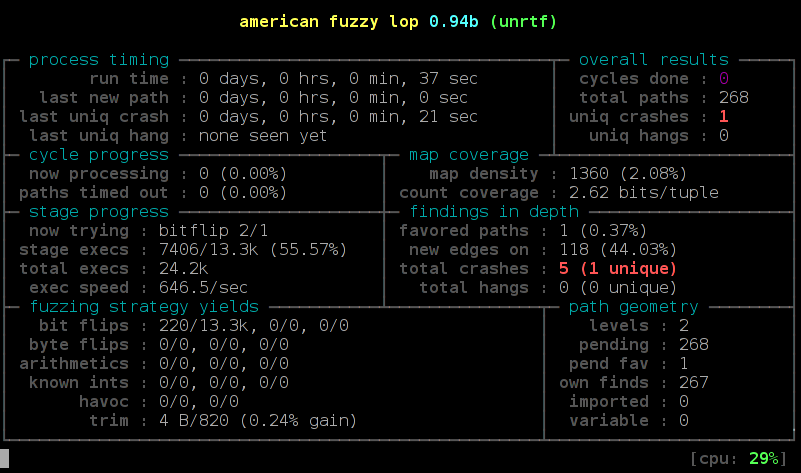
LibFuzzer
Like afl, but targets functions instead of executables.
In-process fuzzing, therefore much faster.
Back to bignum arithmetic
BN_sqr bug in OpenSSL
CVE-2014-3570
For some rare inputs (1 in 2128) the squaring function in OpenSSL produces wrong results.
Security implications?
Probably none, function is not used in critical areas.Can we find this bug with fuzzing?
Bug in 1 out of 1128 inputs.
You can't hit this bug by chance.
Fuzzing BN_sqr
BN_sqr(r1, x);
BN_mul(r2, x, x, ctx);
assert(BN_cmp(r1, r2)==0);
Property-based Fuzz-Testing
"This will never work, but I should try it"
(Ralph-Philipp Weinmann at Black Hat 2015)
It actually works!
AFL is really good at finding bignum bugs
Differential Fuzz-Testing
Calculate same function with two different implementations, compare results.
AFL bignum trophies
- OpenSSL / BN_mod_exp (CVE-2015-3193)
- NSS / mp_div and mp_exptmod (CVE-2016-1938)
- Nettle / P-256 and P-385 scalar multiplications (CVE-2015-8803, CVE-2015-8804, CVE-2015-8805)
- OpenSSL / Poly1305
- MatrixSSL / pstm_exptmod (CVE-2016-6885, CVE-2016-6886, CVE-2016-6887)
MatrixSSL
Several of the devices with RSA-CRT bugs Florian Weimer discovered were using MatrixSSL.
The test input I reported to MatrixSSL had a modulus size unusual for crypto.
"Fix": MatrixSSL restricted the modulus size to common values (e. g. 2048).
So I had to find another input causing miscalculations with a 2048 bit modulus.
Why is fuzzing effective at finding bugs that can't be hit by chance?
Example inputs
BN_sqr, OpenSSL, CVE-2014-3570
E7 E7 E7 E7 E7 E7 E7 E7 E7 E7 E7 E7 E7 E7 E7 E7 E7 E7 E7 E7 E7 E7 E3 E7 E7 E7 E7 E7 E7 E7 E7 E7 E7 E7 E7 E7 E7 E7 E7 E7 E7 E7 E7 E7 E7 E7 E7 E7 E7 E7 E7 E7 E7 E7 E7 E7 E7 E7 E7 E7 E7 E7 E7 E7 E7 E7 E7 E7 E7 E7 E7 E7 E7 E7 E7 E7 E7 E7 E7 E7 E7 E7 E7 E7 E7 E7 E7 E7 E7 E7 E7 E7 E7 E7 E7 E7 E7 E7 E7 E7 E7 E7 E7 E7 E7 E7 E7 E7 E7 E7 E7 E7 E7 E7 E7 E7 E7 E7 E7 E6 67 E7 E7 E7 E7 E7 E7 E7 E7 E7 E7 E7 E7 E7 E7 E7 E7 E7 E7 E7 E7 E7 E7 E7 E7 C7 E7 E7 E7 E7 E7 E7 E7 E7 E7 E7 E7 E7 E7 E7 E7 E7 E7 E7 E7 E7 E7 E7 E7 E7 E7 E7 E7 E7 E7 E7 E7 E7 E7 E7 E7 E7 E7 E7 E7 E7 E7 E7 E7 E7 E7 E7 E7 E7 E7 E7 E7 E7 E7 E7 E7 E7 E7 E7 E7 E7 E7 E7 E7 E7 E7 E7 E7 E7 E7 E7 E7 E7 E7 E7 E7 E7 E7 E7 E7 E7 E7 E7 E7 E7 E7 E7 E7 E7 E7 E7 E7 E7 E7 E7 E7 E7 E7 E7 E7 E7 E7 E7 E7 E7 E7 E7 E7 E7 E7 E7
BN_mod_exp, OpenSSL, CVE-2015-0860
05 05 05 05 05 052 mod 41 41 41 41 41 41 41 41 41 41 41 27 41 41 41 41 41 41 41 41 41 41 41 41 41 41 41 41 41 41 41 41 41 41 41 41 41 41 41 41 41 41 41 41 41 41 41 41 41 41 41 41 41 41 41 41 41 41 41 41 41 41 41 41 41 41 41 41 41 41 41 41 41 41 41 80 00 00 00 00 00 00 00 00 00 00 00 00 00 00 00 00 00 00 00 00 00 00 00 00 00 00 00 00 00 00 00 00 00 00 00 00 00 00 00 00 00 00 00 00 00 00 00 00 00 00 00 00 00 00 00 00 00 00 00 00 00 00 00 00 00 00 00 00 00 00 00 00 00 00 00 00 00 00 00 00 00 00 00 00 00 00 00 00 00 00 00 00 00 00 00 00 00 00 00 00 00 00 00 00 00 00 00 00 00 00 00 00 05
mp_exptmod, NSS, CVE-2016-1938
80FC mod 0F 0F 0F 0F 0F 0F 0F 0F 0F 0F 0F 0F 0F 0F 0F 0F 0F 0F 0F 0F 0F 0F 0F 0F 0F 0F 0F 0F 0F 0F 0F 0F 0F 0F 0F 0F 0F 0E ED 0F 0F 0F 0F 0F 0F 0F 0F 0F 0F 0F 0F 0F 0F 0F 0F 0F 0F 0F 0F 0F 0F 0F 0F 0F 0F 0F 7C 00 00 00 00 00 00 00 00 00 00 00 00 00 00 00 00 00 00 00 00 00 00 00 00 00 00 00 00 00 00 00 00 00 00 00 00 00 00 00 00 00 00
ecc_point_mul, Nettle, CVE-2015-8803
PointP256(FF FF FF FF 00 00 00 01 00 00 00 00 00 00 00 00 00 00 00 00 FF FF FF FF FF FF FF FF 00 1C 2C 00, 97 31 27 5B 8E 97 3C EA FD 8A BF 5A 6E 16 A1 77 F0 5A 34 51 14 FB C7 52 7B 3A 60 BC 65 FE 60 6A) · 1
Repetitions!

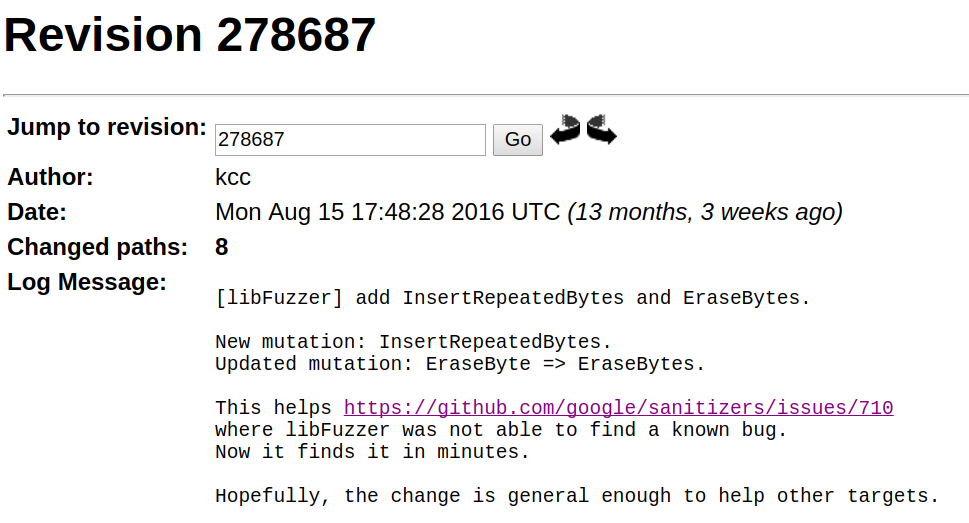
It really works
Later Google's oss-fuzz project found another bug in BN_mod_exp in Openssl with LibFuzzer (CVE-2017-3732).
Retroactive testing
Take known math implementation bug and try to find it with fuzzing.
This usually works.
Examples
- GCM bug in OpenSSL preview (The fragility of AES-GCM authentication algorithm, Gueron, Krasnov, 2013)
- Tweetnacl Carrybit bug
These can be found with LibFuzzer in seconds.
Open question: Are there such bugs where Fuzzing fails?
Formal Verification
A discussion about Fuzzing versus Formal Verification
| Academic: | Academics aren't very interested in crypto fuzzing, because you can't find all the bugs with it. |
| Me: | That may be true, but you can't do that with formal verification either. At least you haven't done it yet. |
Formal verification
I have to admit something: I don't know a whole lot about formal verification.
Formal verification
These things are hardly controversial:
- Formal verification is a lot of work.
- It's hard to apply it to real world software.
- It often comes with limitations and caveats.
- Most cryptographic algorithm implementations are not formally verified.
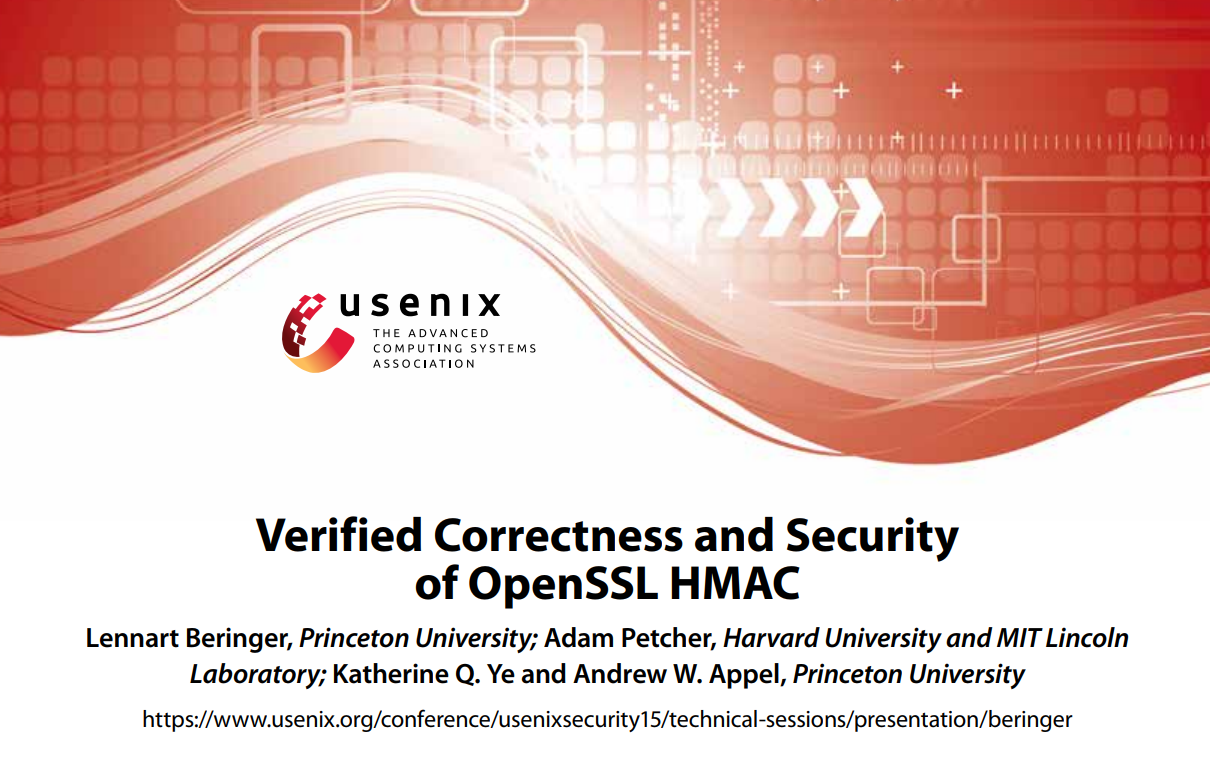
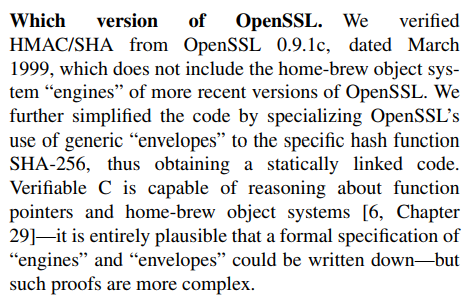
This is disingenuous
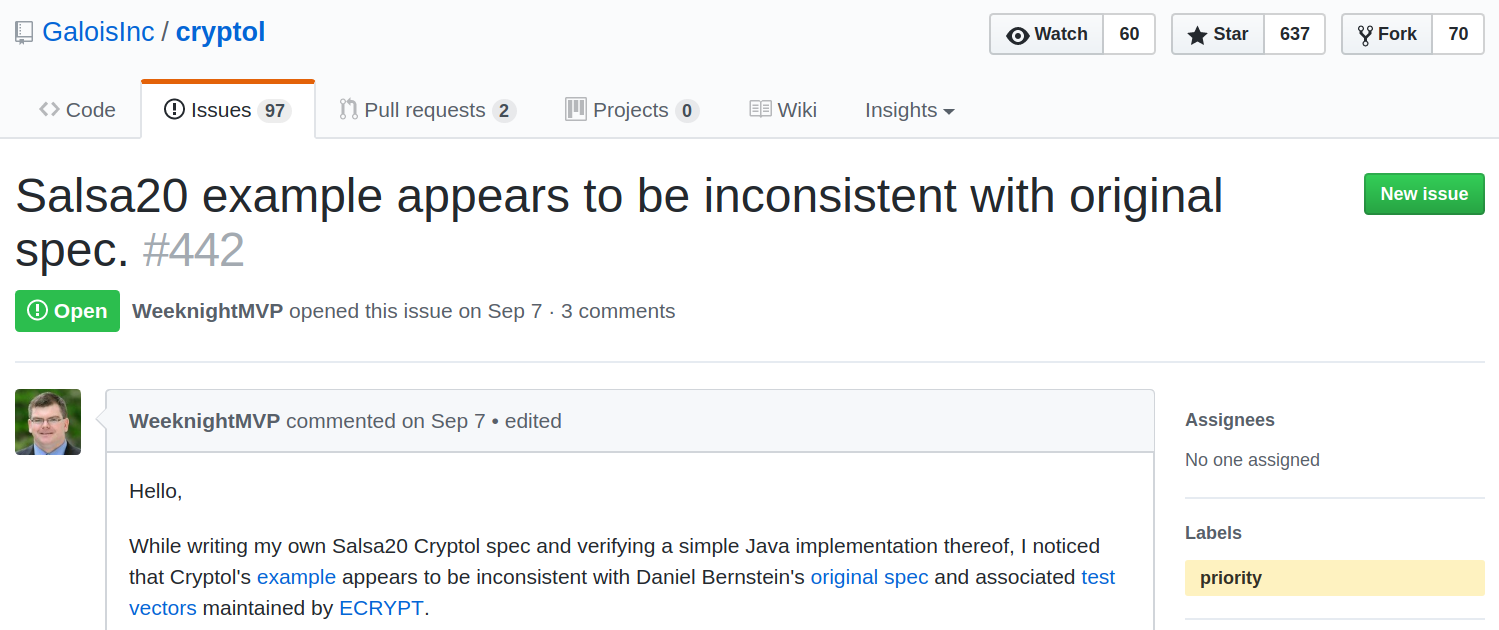
Mozilla works on formally verified Crypto
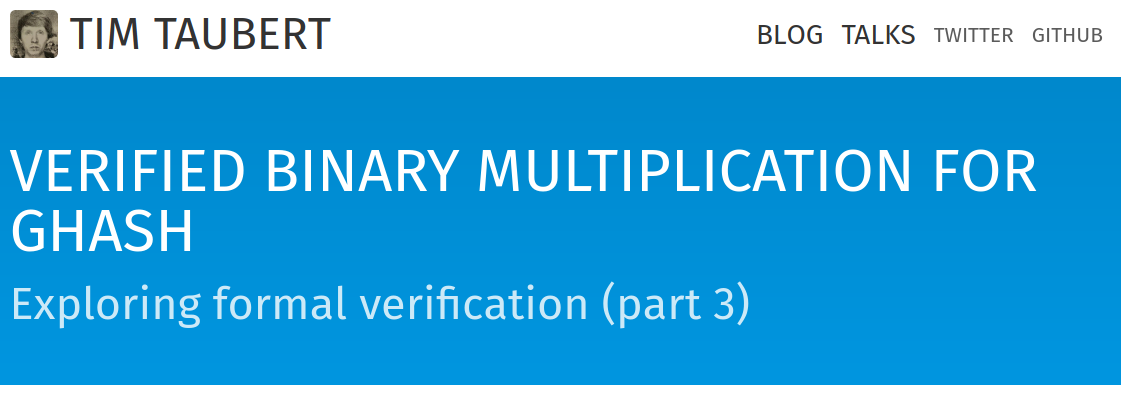
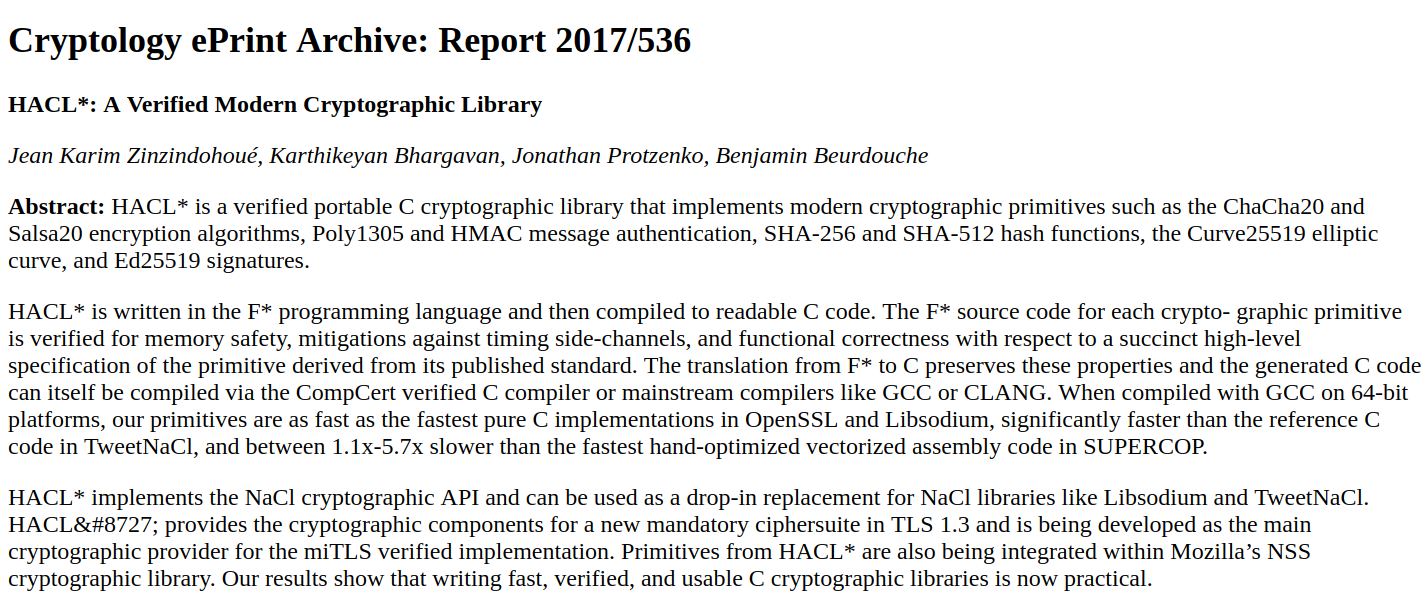
Conclusion
- Differential Fuzz-Testing is extremely effective at finding bugs in basic math and crypto functions.
- There are open questions about the how and why.
- Formal Verification may be interesting for the future, but it's no replacement for other bug finding techniques any time soon.